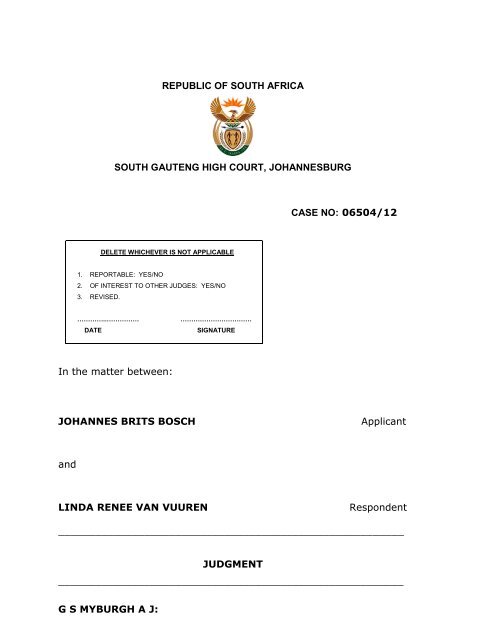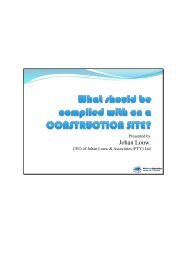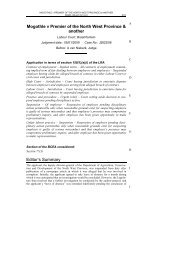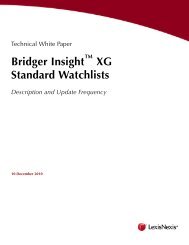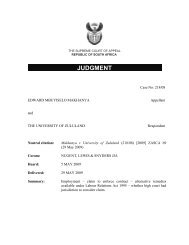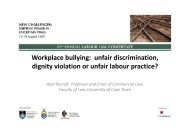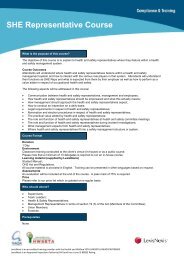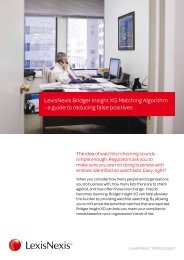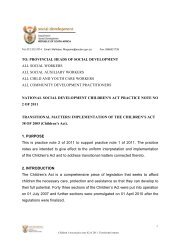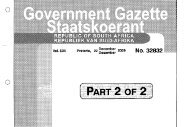Bosch v Van Vuuren - LexisNexis South Africa
Bosch v Van Vuuren - LexisNexis South Africa
Bosch v Van Vuuren - LexisNexis South Africa
Create successful ePaper yourself
Turn your PDF publications into a flip-book with our unique Google optimized e-Paper software.
REPUBLIC OF SOUTH AFRICASOUTH GAUTENG HIGH COURT, JOHANNESBURGCASE NO: 06504/12DELETE WHICHEVER IS NOT APPLICABLE1. REPORTABLE: YES/NO2. OF INTEREST TO OTHER JUDGES: YES/NO3. REVISED.…………..……………DATE……………………………SIGNATUREIn the matter between:JOHANNES BRITS BOSCHApplicantandLINDA RENEE VAN VUURENRespondent________________________________________________________JUDGMENT________________________________________________________G S MYBURGH A J:
21 The Applicant and the Respondent in this matter are thebiological father and the mother respectively of a child whom Iwill refer to only as “R”, who was born to them out of wedlock.The relief sought by the applicant is that he be granted parentalresponsibilities and rights in respect of R and the establishmentof a contact regime in terms of which the level of contact wouldincrease over time – i.e. essentially as is customarily ordered indivorces involving young children. The application was opposedon both legs; the respondent only being to agreeable to limitedand supervised access pending a trial or the hearing of oralevidence which, according to the Respondent, was necessary forthe proper determination of the matter.2 For reasons which will appear hereunder I do not agree with thelatter contention – there being no genuine dispute on the paperswhich would require determination in order to reach a conclusionin relation to the issues which are relevant to either of theclaims. In this regard I think it appropriate to mention at theoutset that a factor which weighs with me in this regard is thatorders in respect of contact are never set in stone but mayalways be revisited on good cause. Indeed, I indicated as muchto counsel for the respondent in the course of the hearing butthe import appeared not to be appreciated.
33 The facts surrounding R’s conception and birth, and the natureof the relationship which prevailed between the Applicant andthe Respondent during that period is not seriously in dispute andmay, for present purposes, be taken to be common cause. Thefacts in this regard can conveniently be summarised as follows.The Applicant and the Respondent met via an Internet datingsite during or about September 2007, whereafter theycommenced an intimate relationship and later moved intogether. It appears that the initial common understanding – orat least certainly the understanding of the Respondent – wasthat the couple would marry. Certainly it appears not to be inquestion that the common intention at that time was that therelationship would be a permanent one. The relationship was arather stormy and unsettled one and during February 2009 theapplicant moved out, not intending to return. Approximately 2months later the applicant was informed by the respondent thatshe was pregnant. The couple maintained contact and somemonths later, during August 2009 the applicant returned to theformer common home and the couple again lived together in arelationship approximating a marriage. During this period, theApplicant supported the Respondent emotionally and financially.He also caused her, and subsequently also R to becomebeneficiaries of his medical aid and paid the majority of the
4medical costs associated with the pregnancy and birth. He alsoattended most of the Respondent’s appointments with hergynaecologist, and was present at R’s birth.4 I would add that it was common cause on the papers that thepregnancy was not the result of an accident. On the contrary,the Respondent’s own version was that the decision was adeliberate one. Her evidence in that regard was to the effectthat she sought to persuade the Applicant that they should firstget married; however, he was resistant (the basis of hisopposition, and in particular whether he was opposed to evergetting married or whether he simply did not see need to wait, isunclear; however I do not consider that anything turns on that).Suffice to say that the child, R, was conceived as the result of adeliberate act in circumstances where the parties were living in alife relationship akin to marriage, and which (or so it appearsfrom the papers) they intended should be a permanent one.5 The relationship between the Applicant and the Respondenthowever continued to be a rather unhappy and unsettled one,and approximately two months after R’s birth the Applicant againleft the common home – this time permanently. The Applicant’sevidence, which was not controverted by the respondent in this
5regard, was that in the intervening period (which is to say, fromapproximately the time of R’s birth until his departure from thecommon home) he assisted the Respondent in caring for R,which assistance included the changing of nappies, bathing andhelping to put her to sleep.6 For reasons which are best known to the Respondent and reallynot addressed in the papers, she caused R to be registered withher surname rather than that of the Applicant. This fact onlycame to the attention of the Applicant some time later.TheApplicant alleged that the Respondent’s failure to give R hissurname constituted evidence of the fact that she was not actingin R’s best interests. The Respondent’s evidence in that regardwas as follows:“95.1 I ….. I admit that I have decided, to in the bestinterests of our minor daughter, that our minordaughter not be registered with the surname of theApplicant. I submit that the reason for my decisionwas because I was never convinced that theApplicant would truly and on a permanent basiswould form a family with myself and our minordaughter due to the history of the Applicant.I
6submit that the only assurance I had was that I wasgoing to be the one to raise our minor daughter andit would thus make sense for her to have mysurname.”7 I mention this specifically at the outset because it is indicative ofthe Respondent’s attitude to the entire matter.Indeed, thethread which runs through her papers is that she and theApplicant hold very different moral values (this in particular inrelation to matters concerning relationships with members of theopposite sex), and also that he lacks the necessary parentingskills to be able to contribute meaningfully and positivelytowards R’s upbringing.8 I will return to this “theme”. For the present, suffice to say thatwhile that may be a valid emotional response, it is one which isutterly lacking in reason and inconsistent with all recognisedauthorities in the field of family law and practice – which is to theeffect that the best interests of children are (save in the mostexceptional instances of a kind which are not here in issue)inevitably best served by the child being recognised by, and asthe child of its biological father. Indeed, it is so well known as tobe a matter of common knowledge that children who are
7perceived to be “illegitimate” are frequently stigmatised, andthat such children stand (if not invariably, then almost so) tosuffer emotional and psychological harm – this both on accountof the perception of having been rejected and abandoned and asresult of stigmatisation. That this is so is a matter of generalcommon experience and it has been recognised by our Courts tobe so for many years.9 Indeed, as the authors of Davel and Skelton: Commentary onthe Children’s Act, state in relation to the enactment of Section21 of the Children’s Act 1 (“ hereinafter simply the Act”):“Section 21 of the Act came into operation on 1 July 2007. Itcontains one of the major reforms of <strong>South</strong> <strong>Africa</strong>’s law of parentand child. The section is based on the premise that if a child’sunmarried father meets certain requirements, he acquiresexactly the same parental responsibilities and rights as thechild’s mother. ... The Act repealed the Natural Fathers ofChildren Born out of Wedlock Act 2 and replaced it with a new setof rules which, inter alia, automatically confers parentalresponsibilities and rights on certain unmarried fathers. ... Oneof the main reasons for the need for law reform was that the12Act 33 of 2005Act 86 of 1997
8denial of automatic responsibilities and rights (apart from theduty of support) to all fathers of children who are born out ofwedlock most probably (I would say certainly) infringed theConstitution of the Republic of <strong>South</strong> <strong>Africa</strong>, 1996 – especiallythe equality clause and the children’s rights clause.”(Myemphasis)10 I will return to the requirements of Section 21. For the timebeing, suffice to say that the section forms part of a statutewhich was enacted primarily to promote and safeguard theinterests of children in a manner consistent with theConstitution.11 Returning to the facts, it appears that the Applicant had regular,albeit fairly limited, contact with R for some time after hisdeparture from the common home. Such contact consisted ofvisits and was took place in the company of the Respondent.After some time, that arrangement became unacceptable to theApplicant, and he sought to structure a new one. However, theRespondent was not amenable to him having any form of contactwith R other than in her presence. I would add in this regardthat there is some dispute on the papers regarding the extent towhich the Applicant in fact exercised his rights of access. In this
9regard, the Respondent states that the Applicant regularly failedto arrive or cancelled at short notice. The Applicant admits toisolated cancellations, and states that for the rest, he did arrivebut that the circumstances in which the Respondent required himto exercise his right of contact with R were unacceptable, andthat he accordingly left after a short while – which theRespondent treated as a “no-show”. I do not consider that it isnecessary for me to reach a decision in relation to these issues.On the contrary, the application itself (which, I might add, is anextremely voluminous one in relation to which the parties musthave expended large amounts of money) bears testimony to thefact that the Applicant is intent on having regular and propercontact with R.12 The parties were not able to reach any agreement.Consequently the Applicant launched the present applicationduring February of this year. As I have said, the relief which issought is, in essence, that he be granted full parentalresponsibilities and rights in respect of R and that theestablishment of a “care and contact” regime of the kind whichthis Court grantson a daily basis in the context of divorceproceedings involving young children. By this I mean to say theregime which begins with outings of limited duration and
10telephone contact and moves, over time, to a position wherethe minor children spend alternate weekends and half of eachlong school vacation with each parent, Mothers’ day with themother and Father’s day with the father, etc.13 In relation to his claim to be recognised as having or beingawarded 3parental responsibilities and rights, the applicant’scase was that he had been living with the respondent in whatwas intended to have been a permanent relationship at the timeof R’s birth and that he accordingly qualified automatically interms of S21 (1) (a) of the Act. In addition it was contended thathe had also satisfied the requirements of subsection (1) (b). Inthat regard his case was that he had consented to the childtaking his name and to being identified as R’s father; that he hadcontributed and intended to continue contributing to R’supbringing and that he had contributed and intended to continuecontributing towards R’s maintenance. In the latter regard it wascommon cause that the applicant was paying maintenance in anamount of R9000.00 per month for R at the time of the hearing.14 The basis of the Respondent’s opposition in respect of theApplicant’s claim for recognition of parental responsibilities and3 The distinction is not material in the present context.
11rights does not appear clearly in any of her affidavits. On thecontrary, paragraph 38.1 of her initial opposing affidavit readsimply as follows:“I take note of the content thereof and deny that theApplicant is entitled to be granted co-parentalresponsibilities and rights with regard to care andguardianship of our minor daughter.”15 As to the prayer in respect of contact, the Applicant appeared toassert a right or entitlement and he also asserted that theregime which he proposed would be in R’s best interest – in anyevent that is how I understood the case. Respondent’s positionwas essentially as set out above.She furthermore sought torely on a report which she obtained from a psychologist, DrElsabe Swanepoel, for the proposition that no order in respect ofcontact should be made until the Applicant had been “fullypsychologically and psychometrically evaluated with a fullbattery of tests”. Indeed, when the matter was argued beforeme, that was the twin refrain, i.e. that the Applicant did not havegood morals (this, as I have said, in particular in relation to hisalleged numerous relationships with other women) and that, inthe absence of favourable expert evidence of the kind alluded to
12in Mrs Swanepoel’s report, he should not be taken to have madeout a case for contact with R – save, as I have said, on arestricted and supervised basis.16 For reasons which will become apparent, I do not consider thatto be the correct approach. Indeed, if it were so, then it seemsthat no father would be able to establish a claim for contact withhis children absent a positive report from a psychologistendorsing, inter alia, his morality and parenting skills in any casewhere matters of that kind are put in issue. That is however notthe practise of our Courts.On the contrary, the Court isconstrained to make a finding based on the available evidence –which may or may not include evidence of an expert kind.Indeed, and as I sought to explain to counsel for the Respondentduring the course of argument, the Court relies heavily on itsown experience in similar matters and moreover moves from theposition that a child’s best interests are, save in very exceptionalcircumstances, best served by frequent and regular contact withboth parents conducive to forming close and appropriaterelationships with both of them.This is, as I have alreadyindicated, consistent with the general body of learning on thesubject. It is also this Court’s own experience.
1317 As I also sought to explain to counsel for the Respondent in thecourse of argument, the Court does not approach each matterwith a “clean slate” and on the basis that the Court has noexperience of these matters. On the contrary, the Courtconsiders each application or matter in the context of developedpractises, including the routine issue of orders of what I refer toas “the ordinary kind” – which regimes have been shown overtime to be the best that can be done in circumstances wheretheir parents do not live under one roof and thus to serve thebest interests of the children concerned. Inasmuch as counselfor the Respondent appeared to find this a somewhat startlingproposition, I emphasise that this is not a matter of the Courtadjudicating applications of this kind based on some a priorisuppositions or assumptions.On the contrary, and as I havealready explained, the Court is cognisant of the body of learningwhich exists in this regard, and is guided by its own practice andexperience derived from the many cases of this kind which servebefore it virtually on a daily basis.18 It is appropriate that I say something at this juncture about thepapers in this matter, and the manner in which the matter hasproceeded generally.As I have already indicated, theapplication was launched during February of this year. It first
14came before this Court on 10 April and thereafter again on 18April; on both occasions on the unopposed roll – or so it wouldappear.At that time, the Family Advocate had not yetconsidered or reported on the matter. The parties had howeverattended mediation – or perhaps “an attempted mediation”would be more appropriate.A copy of the minute of thatmediation was annexed to the founding papers as annexure“JBB3”. It records that the mediator was one Sonia Richards, aneducational psychologist, and that a single meeting was held -this on Tuesday, 8 June 2010. The persons present were thesaid Sonia Richards, as well as the Applicant and theRespondent.19 The agenda for that meeting contained the following items:“Residency; Guardianship; Decision making; Care (custody);Contact (access); Maintenance; Communication; Extendedfamily; Dispute resolution; Death of a parent; Relocating”.20 The goals (the sub-title refers also to “concerns”) are then listedas having been as follows:20.1 In respect of the Applicant:“To formalise contact with his daughter, R.…”; and
15“To discuss R….s care and maintenance”.20.2 In respect of the Respondent:”Concerned how Johan will play his role as the father”; and“That Johan will try and have an over-active role in theupbringing of R”(my emphasis)21 The following is recorded Under the heading “Outcome”,:“Some contact was established.This contact will onlybegin next week (15 June 2010).”22 A number of points are raised under the heading “Additionalpoints related to the mediation on 8 June 2010”. The final pointreads as follows:“Linda terminated the process of mediation.Johan wasprepared to continue with the process.”23 That attempted mediation was dealt with by the Respondent atparagraphs 84 and 85 of her first answering affidavit. I do notconsider it necessary to canvas her entire response. Suffice to
16say that she conceded that Ms Richards indicated that sheconsidered it appropriate that the Applicant should exercisecontact at least three times a week for three hours consecutivelyin order to be able to form a meaningful relationship with theminor child, R, and that she terminated the mediation becauseshe considered that approach to be unacceptable. 424 Subsequent to the filing of the Respondent’s affidavit, the partiesattended a session or sessions with the Family Advocate and alsowith a counsellor, Ms Kriek, who was appointed to assist theFamily Advocate in formulating a report.Ms Kriek is a socialworker.She also holds an LLB degree and is furthermore anadvocate of this Court.According to her report she is (or atleast was, at that time) employed as a family counsellor at theoffice of the Family Advocate.25 The report which Ms Kriek produced is a fairly lengthy one, and itis not practicable that I repeat its content in any detail. Sufficeto say that the report records that although the Respondentindicated that she did not consider the Applicant to be possessedof appropriate parenting skills, she did describe him as a4 It bears mentioning that it appears from the papers that the respondent also terminated a second mediationprocess which was initiated by the office of the Family Advocate – again because she was not prepared toaccept the “ground rules”.
17“wonderlike speelmaat” and that Ms Kriek expressed herself asfollows:“In all circumstances, it is paramount to keep in mind that it is inthe child’s best interests to maintain a relatively conflict-free andhealthy relationship with each parent. It is in the best interestsof everyone involved to support and encourage that relationship,even though this is not always easy.”In that context, she referred to a number of authorities,including Cynthia Milligan and Allan Dowey: “What do childrenneed from their fathers?”, Centre for Theology and Public Issues,University of Edinburgh, 1998, and Kelly and Lamb, ME, 2003,“Developmental issues in relocating issues involving youngchildren: When, Whether and How?” published in the Journal ofFamily Psychology 17(2) 193 – 205, at which the authors statedthe following:“There is substantial evidence that children are more likelyto attain their psychological potential when they are ableto develop and maintain meaningful relationships with bothof their parents whether or not the two parents livetogether”.
18She also cited the following extract from Bosman-Swanepoel, H.M., Fick A and Strydom N A 5 :“Social science research supports the notion that bothparents have a vital role to play in the growth,development and sense of wellbeing of a child ... Childrenneed to be able to enjoy parental love without tension, andwithout being made to feel guilty through the jealousy anddemands of their parents.Children need a balanced,stable and loving relationship with both their parents as tohelp them with the formation of new relationships.Children from estranged, separated and divorced homes,particularly, need to be able to enjoy both parents, withoutany hostile pressures from both parents. ... Children needto see their divorced parents behaving with respect,understanding, courtesy and consideration towards eachother.”26 Ms Kriek concluded that it was important for R to have contactwith both parents in order for her to maintain the child – parentrelationship and, stated that:5 1998 p90
19“The undersigned is of the professional opinion that itwould be in the interests of the minor child if her parentsremain co-holders of parental responsibilities and rights.”And further that:“The undersigned is further of the professional opinion thatit would be in R’s best interest to remain in theRespondent’s care subject to the Applicant’s rights ofreasonable contact. The undersigned is of the professionalopinion that the contact must be slowly phased in with theassistance and guidance of the professional person.”27 Further to those comments Mrs Kriek proposed a phased regime,which was not dissimilar to that sought by the Respondent interms of his notice of motion.28 Ms Kriek’s recommendations were echoed in the report of theFamily Advocate, which was filed on or about 13 July 2012. Therecommendations contained therein read as follows:
20“A.The parties be declared co-holders of parental rightsand responsibilities:B. R’s primary residence is to be fixed with theRespondent;C. The Applicant’s contact as defined in paragraph 10.3on page 15 et seq of Advocate Kriek’s reportannexed hereto marked “A1”. Suchrecommendations are made with the qualificationand suggestion that Robyn Fasser facilitate suchimplementation in the event that the parties presentindignance.”29 The Applicant delivered a replying affidavit on 4 April 2012. Thataffidavit (excluding the annexures) ran to 80 pages; theRespondent’s answering affidavit having run to 141 pages –again excluding the annexures which were extremelyvoluminous.Thereafter, a number of further affidavits wereexchanged – all of this without the leave of the Court. In total,the papers ran to approximately 900 pages. As if the volumealone were not sufficient, some of the papers were only delivered
21during the week commencing 5 November, which is to say, theweek in which the matter was to be heard.30 Given that the matter involves the wellbeing of a child, Iconsidered it appropriate to read all of the papers,notwithstanding the fact that they exceeded the number of setspermitted in terms of the Rules, and that leave for the filing ofadditional papers had not been obtained.31 The sad truth is that these papers, as voluminous as they are,contain very little which is relevant in the context of the presentapplication.Thus, for example, the papers (and in particularthose of the Respondent), are replete with allegations whichwere designed to show that the Applicant does not have as gooda relationship with his two daughters born of his earlier marriageas his papers suggest. To that end, the Respondent annexed toher papers a questionnaire which she directed to the Applicant’sex-wife (with whom she is apparently not on speaking terms)and responses to the questions posed therein. She also annexedphotographs of women with whom the Applicant is alleged tohave had intimate relationships– some of these in various statesof undress. As if this were not sufficient, the papers were evenburdened with an extract from “Beeld” newspaper, which
22recorded some of the details of the divorce order made betweenthe actor Tom Cruise and his former wife, Katie Holmes –including a picture of the couple.32 As I informed counsel for the Respondent during the course ofthe argument, the facts sought to be introduced in thoseportions of the affidavits were wholly irrelevant. To the extentthat they concerned the quality of the relationship between theApplicant and his daughters born of his prior marriage, they arenot matters which are presently before this Court or which thisCourt can properly take cognisance of.These are what arecommonly referred to as “collateral issues’. The result is that, tothe extent that they are not common cause, the Court cannotproperly attach any evidentiary weight to them as the Courtwould, in order to be able to do so, have to form a view withregard to the merits of such collateral issues – a task whichwould be impossible on the available evidence, and alsoinappropriate in the present context.33 As I sought to explain to Respondent’s counsel during the courseof argument, the Court cannot allow itself to be drawn into suchcollateral issues. The Court does however take cognisance of thefact that the Applicant has had extensive contact with his other
23two daughters over an extended period and from an early age,and that no harm has come to them while in his care. Nor havecharges been laid in that regard. I would add in this regard thatit appears from the same papers that the Applicant has in factlaid charges against his ex-wife in connection with her care ofthe two daughters born of their marriage. It also appears fromthose papers that the relationship between the Applicant and hisother two daughters deteriorated inter alia as a result of hisrelationship with the Respondent – of whom they wereapparently afraid. I do not mean to indicate that I consider thatthe Applicant’s ex-wife was guilty of any of the charges whichwere laid or that there was any truth in the allegation that hisother daughters were afraid of the Respondent. On the contrary,my intention is merely to indicate the difficulties and dangerswhich lie in wait for those who might permit themselves todrawn into such collateral issues.34 I turn now to consider whether or not the Applicant has madeout a proper case for relief in terms of Section 21 of the Act.That section reads as follows:“(1) The biological father of a child who does not haveparental responsibilities and rights in respect of the
24child in terms of section 20, acquires full parentalresponsibilities and rights in respect of the child -(a)if at the time of the child's birth he is livingwith the mother in a permanent life-partnership; or(b)if he, regardless of whether he has lived or isliving with the mother-(i)consents to be identified or successfullyapplies in terms of section 26 to be identifiedas the child's father or pays damages in termsof customary law;(ii)contributes or has attempted in goodfaith to contribute to the child's upbringing fora reasonable period; and(iii)contributes or has attempted in goodfaith to contribute towards expenses inconnection with the maintenance of the childfor a reasonable period.”35 It is evident from discussion papers and literature whichpreceded the Act 6 , and indeed from the language of the Actitself, that the regime created by Section 21 was designed notonly to secure certain rights for the fathers of children born out6 For a comprehensive list of relevant literature see Davel and Skelton (supra) 3-12 op cit 2
25of wedlock but that the lawmaker was also mindful of theinterests of children born out of such unions and that it sought toestablish a regime which would best suit their interests.Thesection accordingly provides for the automatic recognition ofparental responsibilities and rights, provided certain criteria aremet. These criteria are designed to put both the father and thechild in substantially the same position (if indeed not theidentical position) as that which applies in respect of childrenborn in wedlock.36 It is apparent from the language of the section that the test is anobjective one. Thus, if an applicant father was living with themother in a permanent life-partnership at the time of the child’sbirth 7 , then he automatically qualifies to have, and in fact has,full parental responsibilities and rights in respect of that child interms of the provisions of Section 21(1)(a). Alternatively, and inthe event that the requirements of sub-paragraph (a) are notfulfilled, then the same result follows if the applicant father isable to show that he has satisfied the requirements of sub-7 As to the arbitrariness of the criterion as framed see A Louw: The Constitutionality of a BiologicalFather’s Recognition as a Parent (2010) 13 PER 156. Reason suggests that the criterion should morecorrectly relate to the time of conception.
26section (b).As I have indicated, if these requirements aresatisfied, then the result flows automatically 8 .37 I mention this specifically as the argument which was advanced,both in the Respondent’s papers and in argument before me,was to the effect that the Applicant had, in addition, todemonstrate that the Applicant’s claim to be recognised ashaving parental responsibilities and rights in respect of R couldonly succeed if the Applicant could demonstrate that suchrecognition would be in R’s best interests. Thus, so the argumentran, the criteria listed in section 21 of the Act fell to be readtogether with the “best interests of the child” standard - theresult being (according to the Respondent) that it was notsufficient for the Applicant to demonstrate simply that he hadsatisfied the criteria listed in the Section.38 As I indicated to counsel for the Respondent in the course ofargument, such an approach would be completely at odds withthe Act.Indeed, and as I attempted to explain, that was, insubstance, the position at common law and also under theNatural Fathers of Children Born out of Wedlock Act 9 ; and it wasprecisely in order to alter that position that Section 21 of the Act8 For authority for this proposition (to the extent that any is required), see Davel and Skelton (supra) 3-12to 3-13.9 Act 86 of 1997.
27was enacted. This represents a fundamental policy shift and itis, accordingly, completely inappropriate to read an additionaloverriding requirement into the section. On the contrary, and asI have already indicated, Section 21 creates a scheme which thelawmaker considers to be (and, I should think, undoubtedly is) inthe best interests of children born out of wedlock.39 Thus, while it is may perhaps be that the Courts have adiscretion to limit or possibly deny the recognition of parentalresponsibilities and rights in appropriate cases such discretion ifit exists at all, would clearly only be exercised against abiological father in the most extraordinary of circumstances.Precisely what such circumstance might be is not a matter withwhich I need concern myself as such considerations clearly donot arise in casu. Indeed, and as I have already pointed out, thelanguage of the section and, in particular the use of the word“acquires” indicates that parental rights and responsibilities areacquired automatically once the requirements of the Section arefulfilled, so that the function of a court seized of a matter of thiskind is limited to giving (or perhaps refusing to give) declaratoryrelief. At the risk of repetition, whether or not such declaratoryfalls to be granted is to be determined on an objective basis withreference to the criteria listed in the section. There is no onus on
28an applicant to show that such recognition would also be in thebest interests of the child.40 The Applicant’s claim in respect of his first prayer (i.e. forrecognition or confirmation of his parental responsibilities andrights) is straightforward.The relevant facts in this regard(which are not seriously disputed) are as follows:40.1 At the time of R’s conception, he and the Respondent wereinvolved in a committed relationship which approximatedmarriage.40.2 After learning that the Respondent was pregnant, hereturned to the former common home and supported her,and the parties at that time lived essentially as man andwife – albeit not married.40.3 He paid the costs of the Respondent’s confinement andwas present at the birth.40.4 Following R’s birth, he and the Respondent continued tolive together, essentially as man and wife.
2940.5 He was willing to allow R to take his name and remains sowilling.40.6 He has not only maintained contact with R, but has alsosought to extend the extent of contact between him andher – to the extent of launching and prosecuting thisapplication.40.7 He has paid maintenance for and continues to paymaintenance for R – the amount at the time of the hearingof this matter being R9 000, 00 per month.41 In the circumstances, it is clear to me that the requirements ofSection 21 of the Act are fulfilled, and that the Applicant isaccordingly entitled to be declared the holder of full parentalresponsibilities and rights in respect of R.42 As I have already indicated, the main thrust of the Respondent’sopposition in this regard was to the effect that the Applicantlacks the necessary moral compass and skills in order to be ableto contribute meaningfully to R’s upbringing. The argument wasaccordingly to the effect that the requirements of Section21(1)(b)(ii) were not fulfilled. The argument was, with respectto counsel, an absurd one. As I indicated during the course of
30argument, the implication would be that persons who did nothave the benefit of a proper education or who were emotionallydeprived during the course of their childhood would always fallfoul of and be unable to fulfil the requirements of the section.The effect of the section, if so applied, would be that a laboureror other unskilled person would find it difficult, to satisfy therequirements of the sub-section, whereas a person who hadbeen blessed with wealthy parents and a good education wouldbe able to do so with relative ease.I have no doubt inconcluding that that is not what the lawmaker intended, andaccordingly reject this argument.43 I turn now to consider the issue of contact. The position in thisregard is that the Court is guided by the recommendations of theFamily Advocate and its own experience.As I have alreadyindicated, the recommendations of the Family Advocate accordsubstantially with the relief sought by the Applicant. Such reliefis moreover (and again, as I have already indicated) inconformity with orders which are routinely made by this Court issimilar matters. In the circumstances, I am of the view that it isappropriate, having regard to the interests of all concerned, thatthe Applicant be granted contact with R substantially inaccordance with his notice of motion.
3144 Turning to the issue of costs, the Applicant has clearly achievedsubstantial success and the normal rule would indicate that he isentitled to his costs.I am however mindful of the growingtendency in matters of this kind for the Court not to make anyaward of costs, provided it is satisfied that the parties have actedbona fide with due regard to what they considered to be theinterests of the minor child or children involved. Having re-readthe papers and having considered the matter as a whole(including the arguments addressed to the Court), I am of theview that the Respondent’s opposition was wholly misguided tothe point of being vexatious. By this I do not mean to say thatthe Respondent did not genuinely believe in the merits of hercase. On the contrary, I use the term “vexatious” in the sense inwhich it has been applied in our Courts – that is to say, that thearguments proffered were utterly without merit, in particularhaving regard to the state of the law at this time. In this regard,I confirm that I repeatedly asked Respondent’s counsel whetheror not he was able to refer me to any authority for theinterpretation which the Respondent sought to place on Section21 of the Act, and that he was unable to do so. Indeed, theauthorities which I was referred to in that context all pre-datedthe Act and were accordingly not relevant given the ground-shift
32which the enactment of S21 of the Act. 10 Much the same appliesin respect of the respondent’s case in respect of the contactaspect. In the circumstances, it is only fitting that Respondent beordered to pay the Applicant’s costs – save however for the costswhich were incurred in respect of the occasions when the matterwas set down for hearing on the unopposed roll.45 In this regard, I would add that I have given seriousconsideration to making an order which would have the effect ofpreventing Respondent’s attorney or counsel from recoveringany fees from her in connection with this matter. In this regard Ibelieve it appropriate to remind legal representatives that theirfunction is not merely to serve as mouthpieces for their clients.On the contrary, the proper function of legal representativesincludes the giving of properly legal advice after havingconsidered the facts of the case in an objective anddispassionate manner. Indeed, an inability to be able to distancehimself properly from the facts of his cases or to able to considerthem objectively and dispassionately has been held to constitutea proper basis for the removal of an attorney from the roll. 11 Thisapplies a fortiori to counsel. Indeed, the arguments in favour ofthe continued existence of a divided profession rely heavily on10 Parts of the Act amount to a codification of the common law; however this is not so in respect of S21.11 Soller v President of The Republic of <strong>South</strong> <strong>Africa</strong> 2005 (3) SA 567 at 571 D-E
33the proposition that counsel are not closely connected with thelay clients and are accordingly in a position to be more objective.46 I would add also that the duty of legal advisors to distancethemselves in matters of this kind is even greater than incommercial matters. There are two obvious reasons. The first isthat we are dealing with children; not pieces of furniture orsoccer balls. The second is that matters of this kind, arising asthey invariably do from failed relationships, stir up deep andstrongly held emotions. The proper function of legal advisors inthese circumstances entails a proper sifting and the giving ofmaturely considered advice; not the fanning of flames or theaddition of fuel to the fire - as is regrettably often the case. 1247 However, Respondent’s legal team were not afforded theopportunity to address this concern and I am mindful of the factthat cases are often persisted in notwithstanding advice given byattorneys and counsel.48 I accordingly make the following order:12 It appears to have been common cause that the combined costs of the application were well in excess ofR500 000.00. One is forced to question whether the money could not have been put to better use by, forinstance, the establishment of a trust for R’s benefit. Indeed, that is clearly so.
341. The applicant is declared to have full parental rights andresponsibilities of the minor child referred to in this judgment as“R”;2. R’s primary residence shall be with the respondent;3. The applicant shall have and be afforded contact with R as follows:3.1. With immediate effect:3.1.1. Every Tuesday from 12:00 to 17:00;3.1.2.One day per weekend, with Saturdays and Sundaysalternating, from 09:00 until 17:00;3.1.3.Reasonable telephonic access between the hours of 17:00and 18:00;3.1.4. For half of Christmas day, being either from 08:00 to13:00 or from 13:00 to 18:00, as the respondent may electand on the basis that the opposite arrangement will applythe following year, the parties alternating between morningsand afternoons;
353.1.5.For the purpose of exercising contact as per 3.1.1 abovethe applicant shall be entitled to collect R from the playschool which she currently intends and shall notifytherespondent in sufficient time to enable her to makeappropriate alternative arrangements in the event of himbeing unable to do so;3.2. From 1 February 2013:3.2.1. As set out in 3.1 above save that the applicant shall beentitled to have R spend either Friday or Saturday night withhim (as the case may be) and to that end, the period ofcontact will commence at 17H00 on Friday evening andterminate at 17:00 on Saturday in respect of “Saturdaycontact” and commenced at on which the period of contactcommences at 17:00 on Saturday and terminate at 17:00 onSunday in respect of “Sunday contact”; and3.2.2.On Fathers’ day, commencing at 09H00 and terminating at17H00; and3.2.3.For not less than 2 hours on the applicant’s birthday if hisbirthday should fall on a day when R is not with him; and
363.2.4.For every alternate public holiday on which R is nototherwise with him from 09:00 until 17:003.3. From 1 July 2013:3.3.1. As per 3.2 above save that the contact provided for in3.2.1 above will fall away and the applicant will instead beentitled to have R spend each alternate weekend with him,which period shall commence at 17:00 on Friday eveningand terminate at 17H00 on Sunday evening.3.4. From 1 December 2013:3.4.1.As per 3.3 above; and3.4.2. Half of each school holiday period which, in the case ofthe December/January school holiday period shall be soarranged that R spends Christmas with one parent and NewYear (commencing by not later than 16:00 on New Years’Eve) with the other parent, with the periods alternating fromyear to year – the respondent having the right to elect whichhalf R will spend with her if the parties should be unable toagree; and
373.4.3.The provisions of para 3.1.4 shall continue to apply (infavour of whichever parent R is not with on Christmas day),save to the extent that it may be impossible or whollyimpracticable to afford contact to the other parent onChristmas day as contemplated therein – by way of exampleif R and the parent whom she is with should happen to beaway on holiday.4. The applicant shall, for the purpose of exercising contact in terms ofthis order, be entitled to remove R from the estate development onwhich she is currently living and any estate or development whichthe respondent may in future move to and shall be entitled to allowR to have contact with his other daughters as, when and to theextent that he may consider appropriate;5. The applicant shall ensure that R is properly secured in an SABSapproved child seat or, once she is of an appropriate age and size,an appropriate “booster seat” and/or restraint whenever she travelsin a motor vehicle;6. The Respondent is ordered to pay the costs of the application savefor those costs which were incurred in connection with and as aresult of the matter having been enrolled on the unopposed roll on
3810 April 2012, 4 September 2012 and 9 October 2012, which costsshall be borne by the applicant._______________________________G S MYBURGH AJHeard:Delivered:Postscript: I would encourage the parties to attempt to agree acomprehensive parenting plan, including the appointment of a anappropriately qualified parent plan manager as the conclusion ofsuch an agreement would be in the best interests of allconcerned and render further approaches to the Courtsunnecessary. While I appreciate that that may be easier saidthan done there are a number of practitioners who practiseextensively in the field of family law who are well qualified tomediate between the parties and so facilitate the conclusion ofsuch an agreement. What is more, this judgment will serve as aguide, so rendering the exercise less difficult than it wouldotherwise have been.


